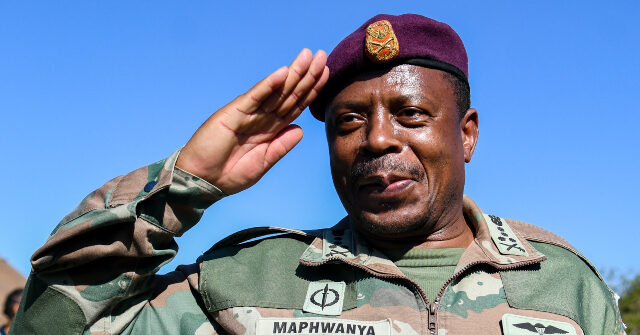Gen. Rudzani Maphwanya, chief of the South African National Defense Force, traveled to Tehran on Tuesday for a meeting with his opposite number, Maj. Gen. Amir Hatami.
The two styled themselves as partners in fighting “oppression,” even though Iran is one of the most oppressive governments on earth, and the world’s worst state sponsor of terrorism.
Of course, the Iranian and South African military chiefs preferred a more politically agreeable definition of “oppression” as an exclusively Western sin, while Iran and South Africa were driven by “anti-colonial, anti-arrogance, and justice-driven principles.”
“The Islamic Republic and South Africa have always supported each other and oppressed nations,” Hatami declared. He absurdly claimed Iran was devoted to a new world order “based on justice and human dignity,” even though Iran is a place where young women can be murdered for not wearing their headscarves correctly.
The true purpose of the grotesque spectacle was for Iran to thank South Africa for taking its side against Israel, which dealt a humiliating defeat to the Iranian military in June.
South Africa has been extremely critical of Israel for bombing the Iranian nuclear weapons program and for its prosecution of the Gaza war launched by Iran’s ally Hamas on October 7, 2023. South Africa has accused Israel of “genocide” at the International Court of Justice (ICJ) and has demanded the court arrest Israeli Prime Minister Benjamin Netanyahu.
The mutual gushing between Hatami and Maphwanya was a political transaction in which the monstrous Iranian regime thanked South Africa for services rendered.
Maphwanya transmitted the expected response by saying, “The Republic of South Africa and the Islamic Republic of Iran have common goals,” including that they “always stand alongside the oppressed and defenseless people of the world.”
The South African general railed against Israel for bombing Palestinians “while they are standing in line for food,” and promised to keep plugging away at the ICJ to ensure “those responsible for genocide are held accountable.”
“Today, the Islamic Revolutionary Guard Corps is recognized as the world’s largest anti-terrorist force and possesses valuable experiences that it can share with South Africa,” he declared. The IRGC was designated a terrorist organization by the United States government in 2019.
Foreign Policy (FP) noted in June that South Africa’s response to the U.S. bombing of Iran’s nuclear program was rather muted compared to its fiery denunciation of Israel’s airstrikes, in part because the South African government has grown nervous about provoking President Donald Trump.
South Africa’s close relationship with Iran was one of the reasons Trump returned to office with a confrontational approach to Pretoria. Trump specifically mentioned “relations with Iran to develop commercial, military, and nuclear arrangements” when he issued an executive order ending financial aid to South Africa in February.
South Africa has been sending clear signals that it values its relationship with Iran and its commitment to the Palestinian cause above other international ties. South Africa’s ruling African National Congress (ANC) also has ties with the leadership of Hamas.
“We can’t hide our friends when they actually identified with us, in the most difficult times of our history,” Nomvula Mokonyane, the first deputy secretary-general of the ANC, said in March when hosting the Iranian ambassador at party headquarters.
One of the big stumbling blocks to South Africa completing its journey into the Iran-China-Russia axis of tyranny is domestic politics. The ANC lost a good deal of its once-monolithic support over the past few elections, forcing it to partner with the Democratic Alliance (DA), a party much friendlier to the Western world.
The Institute for Security Studies (ISS) wondered in March if South Africans at large were willing to pay a price for the ANC’s “revolutionary nostalgia” toward Iran. ANC leaders admired Iran’s theocratic revolution in 1979, and they came to see the Iranians as spiritual partners and political backers of their own revolutionary ambitions in the 80s, even though South Africa’s trade relationship with Iran has never been terribly large.
The ANC also has a tendency to treat all of its allies from the apartheid era as friends for life, which can produce the odd strategic conundrum – as when Ukraine chided South Africa for siding with Russia after it invaded Ukraine in 2022, even though South Africa’s debt of gratitude is properly owed to the defunct Soviet Union, to which Ukraine also belonged.
“It is curious that the ANC is so friendly with Hamas’ main sponsor and Hamas itself, which is dedicated to a one-state solution to the Israel-Palestine conflict,” the ISS noted. “Officially, the ANC still supports a two-state solution and is closer to the Palestine Liberation Organization – the co-architect of the two-state solution – than to Hamas.”
Read the full article here


